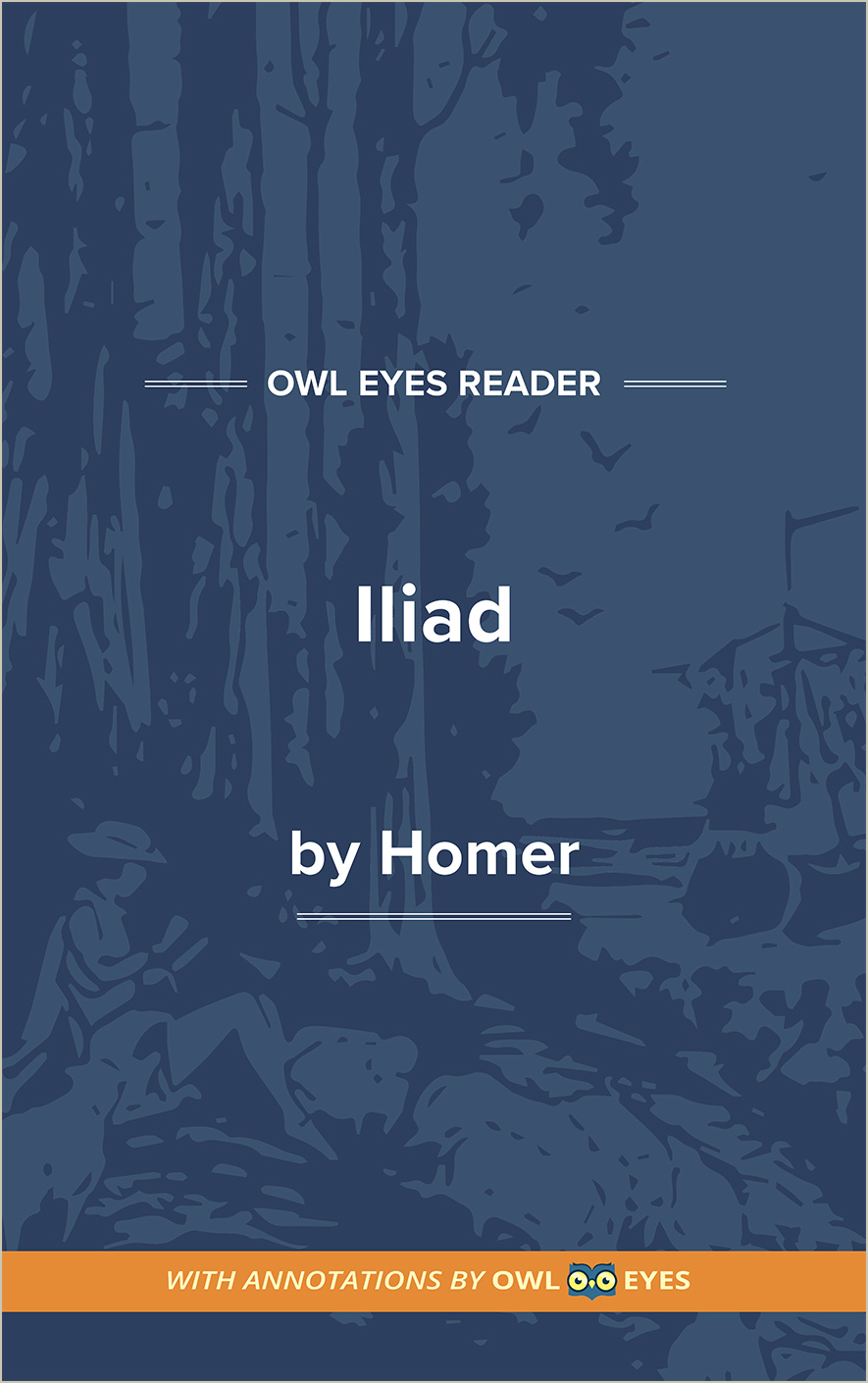Analysis Pages
Themes in Iliad
Mortality vs. Immortality: The painful awareness of mortality is an undercurrent in almost every character’s actions in the Iliad. The ancient Greek value kleos (glory won through great deeds, often in battle) is closely linked to this theme of mortality in that it is the greatest motivator for Greek heroes. Heroes are not immortal like the gods, as evidenced by the brutal battle scenes throughout the text, and the only way to become immortal is through honorable deeds and prowess on the battlefield, which immortalize a hero's name. We also see immortal beings descending from Olympus to fight in the battles of mortals and being wounded, which seems to suggest even the gods aren’t truly immortal and are subject to the influence of fate and prophecy.
Glory/Honor vs. Shame: How the characters in the Iliad achieve glory in battle hints at the idea that the text itself celebrates war. The Iliad seems to assert that the only way to achieve glory and be honorable (achieving kleos) is through success in battle, which readers can see through the Iliad’s treatment of its characters. We see Achilles celebrated for choosing to kill Hector and avenge Patroclus rather than return home to live with his father. Paris brings shame upon himself and earns the scorn of his family and his lover because he doesn’t care for battle. This need for glory surpasses even the Greek value of oikos, or the contract of the home. Hector and Achilles both know they are fated to die before riding into battle, yet they still choose to pursue the path of glory—and are celebrated for it—because they value kleos over their own lives, even if it means abandoning loved ones.
Fate and Divine Intervention vs. Free Will: The tension between fate, free will, and divine intervention is present throughout the Iliad. In the very opening paragraph, the line “so were the counsels of Jove fulfilled” reveals the powerful influence Zeus’s will holds over the entirety of the story, and the other gods’ meddling allows many characters to escape their predestined fates. From this we see that the gods do not control fate, but are able to act against it (though not without consequence). We also see prophecies fulfilled in the events of the story, and countless men fall at the hands of fate. Free will is not completely irrelevant, however; Achilles is given a choice. He can go home and live a full life without glory, or enter battle and win both glory and an early death. This is called a double fate and is significant because it is rare in myth.
Themes Examples in Iliad:
Book I
🔒"the anger of Achilles..." See in text (Book I)
"SING, O GODDESS, the anger of Achilles son of Peleus..." See in text (Book I)
Book III
🔒"my abhorred and miserable self...." See in text (Book III)
Book IV
🔒"his bowels came gushing out..." See in text (Book IV)
Book VI
🔒"if a man's hour is come, be he brave or be he coward, there is no escape for him when he has once been born..." See in text (Book VI)
"I know nothing save to fight bravely in the forefront of the Trojan host and win renown alike for my father and myself..." See in text (Book VI)
Book VII
🔒"They fought with might and main, but were reconciled and parted in friendship...." See in text (Book VII)
"you can shatter their wall and fling it into the sea; you can cover the beach with sand again, and the great wall of the Achaeans will then be utterly effaced...." See in text (Book VII)
Book IX
🔒"Even now, however, be appeased, and put away your anger from you..." See in text (Book IX)
"If I stay here and fight, I shall not return alive but my name will live for ever: whereas if I go home my name will die, but it will be long ere death shall take me...." See in text (Book IX)
Book XV
🔒"“Be men, my friends,” he cried, “and respect one another's good opinion..." See in text (Book XV)
"Achilles will then send his comrade Patroclus into battle, and Hector will kill him in front of Ilius after he has slain many warriors, and among them my own noble son Sarpedon. Achilles will kill Hector to avenge Patroclus, and from that time I will bring it about that the Achaeans shall persistently drive the Trojans back till they fulfil the counsels of Minerva and take Ilius..." See in text (Book XV)
Book XVII
🔒"of all creatures that live and move upon the earth there is none so pitiable as he is..." See in text (Book XVII)
Book XVIII
🔒"Meanwhile the people were gathered..." See in text (Book XVIII)
Book XIX
🔒"Thus did he speak, and the Achaeans rejoiced in that he had put away his anger...." See in text (Book XIX)
Book XXI
🔒"he was uneasy lest the wall should not hold out and the Danaans should take the city then and there, before its hour had come..." See in text (Book XXI)
"a pack of miserable mortals, who come out like leaves in summer and eat the fruit of the field, and presently fall lifeless to the ground...." See in text (Book XXI)
Book XXIII
🔒"Oedipus..." See in text (Book XXIII)
Book XXIV
🔒"The two wept bitterly—Priam, as he lay at Achilles' feet, weeping for Hector, and Achilles now for his father and now for Patroclus, till the house was filled with their lamentation..." See in text (Book XXIV)

